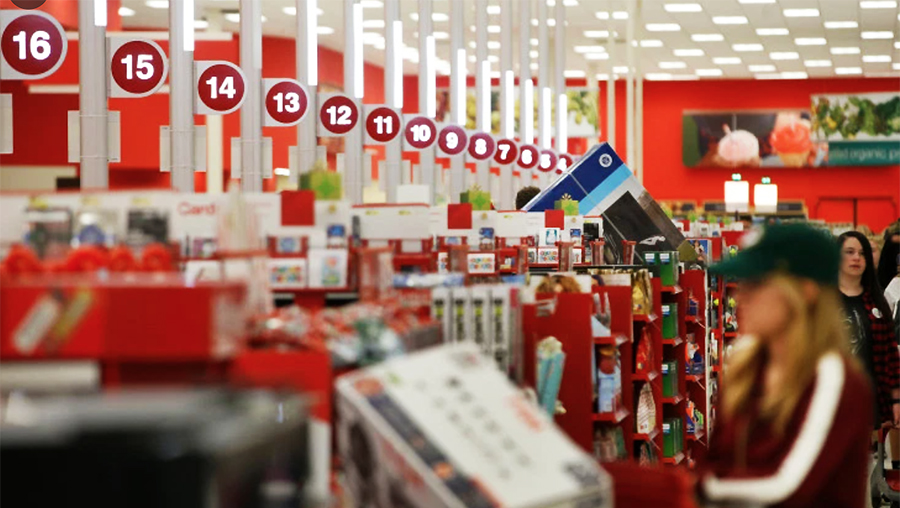Target Corp. said quarter-to-date, total company comparable sales have grown more than 7 percent, but warned that a number of factors will reduce first-quarter profitability. These include investments in pay and benefits to support team members during the COVID-19 crisis and a shift in category mix towards lower-margin categories.
Other factors include the shift in channel mix towards digital fulfillment and inventory write-downs in Apparel & Accessories to reflect the rapid deceleration in sales trends.
Together, these factors are expected to reduce the company’s first-quarter operating margin rate by more than 5 percentage points.
The more than 7 percent comp gain reflects a slight decline in stores and more than 100 percent growth in digital channels.
Across the company’s core merchandise categories, comparable sales have grown more than 20 percent in Essentials and Food & Beverage, more than 16 percent in Hardlines, increased slightly in Home and declined more than 20 percent in Apparel & Accessories. During the quarter, there have been significant changes in shopping patterns, as guests have reacted to the COVID-19 pandemic. Throughout this period, Target has seen broad market-share gains across its core merchandising categories.
As previously disclosed in the company’s March 25 press release, for the month of February, total company comparable sales increased 3.8 percent with strength across its entire multi-category portfolio. Late in the month, Target saw an increase in traffic and comparable sales in both its stores and digital channels as consumers began stock-up shopping.
Around the middle of March, there was an even stronger surge in traffic and sales, while the category mix became heavily concentrated in the Essentials and Food & Beverage categories. Later in the month, as guests across the country began to shelter in place, sales trends in stores softened significantly while digital sales accelerated dramatically. For the month in total, comparable sales increased in the low double digits, reflecting mid-single-digit growth in stores and more than 100 percent in Target’s digital channels. Across the company’s merchandise assortment, March comparable sales increased approximately 40 percent in both Essentials and Food & Beverage, and by approximately 20 percent in Hardlines. For the month, comparable sales declined in the low single digits in Home and more than 30 percent in Apparel & Accessories.
In early April, sales trends were similar to late March but improved meaningfully beginning April 15. Month-to-date in April, comparable sales have increased more than 5 percent, as store comparable sales have declined in the mid-teens while digital comparable sales have increased by more than 275 percent. Across core categories, month-to-date comparable sales have grown more than 12 percent in both Essentials and Food & Beverage, more than 30 percent in Hardlines and in the high teens in Home, while declining more than 40 percent in Apparel & Accessories.
The company withdrew its first-quarter guidance on March 25.
The retailer provided a financial update while announcing extensions of enhanced team member wages and benefits, and provided business updates related to the impact of the novel coronavirus (COVID-19). Target will extend its $2 an hour temporary wage increase until May 30. The Company will also continue to extend access to free, safe and reliable back-up care for team members, and a 30-day paid leave for team members who are 65 or older, pregnant or who have underlying medical conditions as defined by the CDC, through the end of May. This follows a previously-announced $300 million investment in wages, bonuses, paid leave, and benefits for its frontline team members, as outlined in the Company’s March 25 press release. These actions are in addition to protective equipment, dedicated shopping hours and discounts the Company has introduced to support its team members during the pandemic.
“Our strategy was built to be durable and sustainable in any environment and its strength is driving our business in the face of marked shifts in shopping behaviors caused by COVID-19,” said Brian Cornell, chairman and CEO. “Because of our strong business model, we are able to make considerable investments to support our team, put protections in place, and adjust to serve our guests who are being advised to shelter in place and avoid stores. As a result, we are seeing record-setting digital growth, strong demand for our same-day fulfillment services and broad market-share gains across each of our core categories. While this crisis will certainly put near-term pressure on our profitability, that pressure is far outweighed by doing right by our team and our guests. We’re confident the actions we’re taking today will drive growth and greater guest affinity over the long-term.”
Photo courtesy Target
















